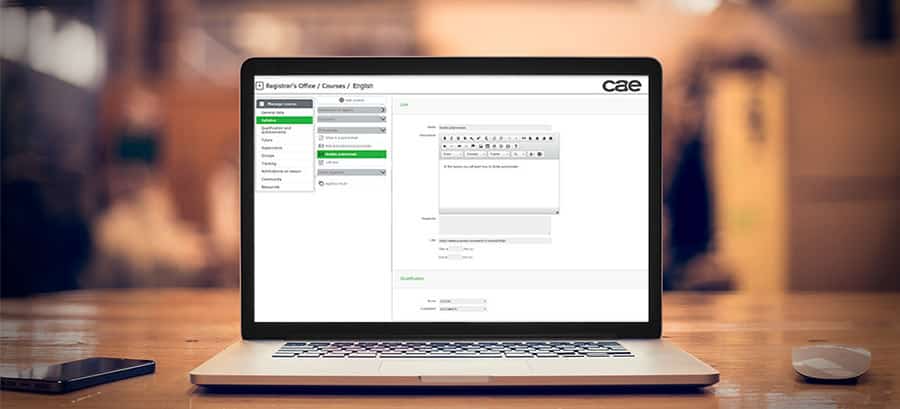Every day there are more academies, educational centers and companies that identify the need for an e-learning platform to manage all their educational activities. This can be for classes and courses inside and outside the classroom, facilitating 100% autonomous training, as well as for the administration of registrations, diplomas, etc. But in order to make the right decision, it is essential to know the keys to choosing an e-learning platform.
Choosing new technology always entails an initial investment and that is why this is such an important point: making a hurried or uninformed decision could mean even greater expense. It is necessary to be very clear about the needs of your institution and what you expect from a platform. To guide you through the main features and benefits of an educational platform, we will review 6 keys points consider when choosing a quality e-learning platform for your language courses.

How to choose e-learning platforms for your online courses?
You should keep in mind that this is a long-term choice. Setting up a system and changing every few months or even every course will only result in a waste of resources (money as well as time). Many platforms are not compatible, not all of them allow you to export all the information you want to reuse and most importantly, when your teaching staff already knows how to use the program, it you realize that it does not cover the real needs of your center and you have to start learning again.
Keys to choosing a quality e-learning platform
The best thing to do is invite both the administration and the teachers to tell you what benefits they expect and the characteristics or functions that would be most useful for them. With all the information, prepare a list to help you compare between the different options on the market. To help you recognize the most important points on that list, here are 6 keys to choosing e-learning platforms that will help you make your decision.
#1 Personalization
One of the first aspects that you should look at for your choice is the customization that the LMS offers. With CAE, your center can change course colors and add your own logo to align with your brand image. But beyond the corporate aspect, a good learning management system must be able to offer the tools to enable personalized education, allowing you to upload your own content and share it easily.
#2 Accesibility
Each student studies at their own pace, therefore it is essential that they are offered the option of setting their own schedule, making studying compatible with the rest of their obligations. Whether we are talking about 100% self-study courses, or if we are referring to tasks set as homework (which the student makes time to do), the opportunity to access the material whenever and wherever is vital. Cloud-based educational software is one of the best options to enable real freedom.
- Unlimited 24-hour access to the platform for flexible and autonomous training
- Conversation groups to practice with other students online
#3 Verify the data security protocols of the e-learning platforms you are considering
Verification of data security protocols on educational platforms is an essential part of guaranteeing privacy and protection of your students’ personal information. These protocols are established both to protect user data and to prevent unauthorized access or misuse of data.
Among the measures that are used in this type of platform, end-to-end encryption, firewalls or frequent audits stand out as the most important. Therefore, you should always ask about the encryption and security protocols that the LMS provider has put in place to protect this information.
In addition, it is essential that the platform complies with the GDPR, the General Data Protection Regulation of the European Union or similar regulations.
Having a safe environment promotes trustworthy learning and improves the image of your institution.

#4 E-learning platforms with offline access
While most LMS options are compatible with virtually any tablet, mobile or computer, there are some that even allow access to the course offline.
With our LMS platforms and Dexway language courses, students can download content when online and continue with lessons anytime without WiFi or data. When they come back online, the LMS syncs and updates their course progress to reflect assignments, assignments, and assessments that have been completed offline.
#5 E-learning platforms that evolve with your needs
Many e-learning platforms come with lots of features and functions that may fit what you need now, but your needs may change in the future. Opting for an LMS that can evolve at your pace will allow you to reach your true potential. Choose an e-learning provider that allows you to grow:
- Continuous updates
- Integration of the latest technological innovations
- Adaptation to new devices (resolutions, sizes… a perfect user experience)
- Training and support
#6 Gather feedback from e-learning platforms
You may think you have a clear idea of what your students need in an online course, but it doesn’t hurt to make sure. Just as you investigated your students’ mobile device preferences, you should solicit further feedback on all aspects of your learning management system. This helps identify which LMS is best suited for your organization’s goals and objectives, as well as the talents and skills of your e-learning developer. For example, you might find e-learning platforms that offer a lot of high-tech features and functions, but your e-learning team really doesn’t have the experience or knowledge to use this tool effectively, leading to a steep learning curve which can be a long and expensive process.
Do you want to know more about the keys to choosing an e-learning platform for your online courses? Contact us.
You may also like:
- How does an LMS platform help schools and students go back to school?
- Virtual classes: How to Teach them in a Learning Platform
- Tips for e-learning content that inspires and motivates students

